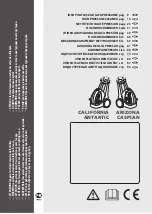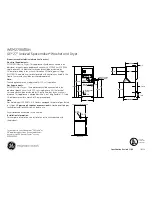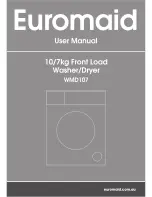
8
Wash Temperature
Hot
Some cold water is added to save
energy. This will be cooler than
your hot water heater setting.
Warm
Some cold water will be added, so
this will be cooler than what your
previous washer provided.
Cool
Warm water may be added to
assist in soil removal and to help
dissolve detergents.
Cold
This is the temperature from your
faucet. If your tap cold water is
very cold, warm water may be
added to assist in soil removal
and help dissolve detergent.
Suggested Fabrics
Whites and pastels
Durable garments
Heavy soils
Bright colors
Moderate to light soils
Colors that bleed
or fade
Light soils
Dark colors that
bleed or fade
Light soils
Select the Load Size setting most suitable for your load. Small
will add a low amount of water for smaller loads and Large
will add the most amount of water for large or bulky loads.
Garments need to move freely.
7.
Select LOAD SIZE
8.
Select WASH TEMPERATURE
Once you select a cycle, select the desired temperature by
turning the Wash Temperature knob to the appropriate setting
based on your load. All rinses are cold.
NOTE:
Always read and follow fabric care label instructions to
avoid damage to your garments.
If you are using fabric softener, be sure to set the Fabric
Softener option knob to YES.
9.
Select options, if desired (on some
models)
10.
Press START/PAUSE/UNLOCK
LID to begin wash cycle
Press the START/Pause/Unlock Lid button to start the wash
cycle. When the cycle has finished, the CYCLE COMPLETE
indicator will light. Promptly remove garments after cycle has
completed to avoid odor, reduce wrinkling, and rusting of
metal hooks, zippers, and snaps.
Unlocking the lid to add garments
If you need to open the lid to add 1 or 2 missed garments:
Press START/Pause/Unlock Lid; the lid will unlock once
the washer movement has stopped. This may take several
minutes if the load was spinning at high speed. Then close
lid and press START/Pause/Unlock Lid again to restart
the cycle.
If lid is left open for more than 10 minutes, the water will
pump out automatically.
WASHER MAINTENANCE
Replace inlet hoses after 5 years of use to reduce the risk
of hose failure. Periodically inspect and replace inlet hoses
if bulges, kinks, cuts, wear, or leaks are found.
When replacing your inlet hoses, mark the date of
replacement on the label with a permanent marker.
NOTE:
This washer does not include inlet hoses. See the
“Installation Instructions” for more information.
WATER INLET HOSES
Содержание Top-Loading Washer
Страница 2: ...2 WASHER SAFETY ...
Страница 15: ...15 SÉCURITÉ DE LA LAVEUSE ...









































